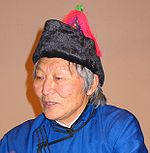- Galsan Tschinag
-
Galsan Tschinag
Чинаагийн Галсан
At a reading in Munich in 2006Born 26 December 1944
Bayan-Ölgii Province, MongoliaOccupation poet, novelist, shaman, actor Galsan Tschinag (Чинаагийн Галсан), born Irgit Shynykbai-oglu Dshurukuwaa, (* 26 December 1944 in Bayan-Ölgii Province, Mongolia) is internationally known as a Mongolian writer of novels, poems, and essays in the German language, though he hails from a Tuvan background. He is also often described as a Shaman, and is also a teacher and an actor.
Contents
Life
Born in the upper Altai Mountains in western Mongolia, the youngest son of a Tuvan shaman, Galsan majored in German studies at the Karl Marx University in Leipzig, East Germany (1962-1968). He did his thesis work under Erwin Strittmatter, and upon graduation began to work as a German teacher at the National University of Mongolia. In 1976 his teaching license was revoked because of his "political untrustworthiness". He continued to work twelve-hour shifts, shuttling between all four of the Mongolian universities. In 1980, at the age of 36, Galsan was diagnosed with a life-threatening heart condition. He later recovered from the condition and credits his "shamanic powers" and plenty of exercise for saving his life.
Today, the author spends most of the year at his home in the Mongolian capital city of Ulan Bator, together with his family of nearly 20. He also spends much time giving readings in the German-speaking world and across Europe, as well as seeking to get closer to his Tuvan roots in the western Mongolian steppes. Though he still writes mainly in German, his books have been translated into many other languages. In addition to his writing, Galsan is an activist for the Tuvan minority and practices shamanistic healing.[1]
Works in English
- 2004 All the Paths Around Your Yurt (online poetry translation from Alle Pfade um deine Jurte, 1995)
- 2004 You Will Always Be Untamable (online poetry translation from Nimmer werde ich dich zähmen können, 1996)
- 2004 Cloud Dogs (online poetry translation from Wolkenhunde, 1998)
- 2004 Oracle Stones as Red as the Sun: Songs of the Shaman (online poetry translation from Sonnenrote Orakelsteine, 1999)
- 2004 The Stone Man at Ak-Hem (online poetry translation from Der Steinmensch zu Ak-Hem, 2002)
- 2006 The Blue Sky: A Novel (translation in print from Der blaue Himmel, 1994)
- 2007 Beyond the Silence (online poetry translation from Jenseits des Schweigens, 2006)
Works in German
(with tentative English titles)
- 1981 "Eine tuwinische Geschichte und andere Erzählungen" (A Tuvan Story and other short stories)
- 1993 "Das Ende des Liedes" (The End of it)
- 1994 "Der blaue Himmel" (The Blue Sky)
- 1995 "Zwanzig und ein Tag" (Twenty-One Days)
- 1996 "Nimmer werde ich dich zähmen können" (Never Will I Tame You)
- 1997 "Die Karawane" (The Caravan)
- 1997 "Im Land der zornigen Winde" (In the Land of the Angry Winds, with co-author Amelie Schenk)
- 1997 "Der siebzehnte Tag" (The Seventeenth Day)
- 1999 "Die graue Erde" (The Grey Earth)
- 1999 "Der Wolf und die Hündin" (The Wolf and the Bitch)
- 2000 "Der weiße Berg" (The White Mountain)
- 2001 "Dojnaa"
- 2002 "Tau und Gras" (Dew and Grass)
- 2004 "Das geraubte Kind" (The Robbed Child)
Awards
- 1992 Adelbert-von-Chamisso-Preis
- 1995 Puchheimer Leserpreis
- 2001 Heimito-von-Doderer-Preis
- 2002 Bundesverdienstkreuz
References
External links
- Images of Migration and Change in the German-language Poetry of Galsan Tschinag by Richard Hacken (pdf)
- The Poetry of Galsan Tschinag: An Introduction
- Friends of Altai
- "Das edle, gute Deutschland wird fortbestehen", by Wolfgang Harrer a.k.a. Blau and Alysa Selene, ZDF (in German, with audio)
- Galsan Tschinag in der ZDF Mediathek (video in German)
- Galsan Tschinag's Website (German)
Bibliography
Categories:- Tuvan people
- Mongolian writers
- German writers
- University of Leipzig alumni
- Living people
- 1944 births
- Recipients of the Cross of the Order of Merit of the Federal Republic of Germany
Wikimedia Foundation. 2010.

